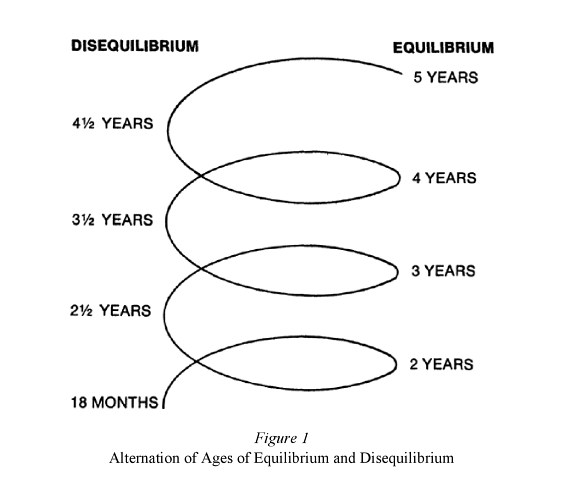lie low, sweet chariot

There’s a handy chart that appears in many of the age-defining slim volumes written by Louisa Ames Bates, a psychologist and parent-help-yourself-er. (“Your Two Year Old: Terrible or Tender” “Your Four Year Old: Wild and Wonderful” “Your Five Year Old: Sunny and Serene”)
It looks like this:

A rather serpentine creature, this curvature of behavior fortune-telling has been on my mind lately as I watch both girls simultaneously hitting their half-birthday this month become something wildly infuriating and unpredictable, just every now and again. On a Tuesday evening, but not on a Thursday. A terrible Friday morning, but a wonderful Saturday afternoon.
I think all parents stop fearing that seemingly unpredictable creature: the public tantrum, once they consistently identifies its wingmen. Fatigue, malnutrition, overindulgence. They’re not really that unpredictable; thus the resigned look you may spot on a mother’s face at the grocery store. She probably knew going in that this would happen, but she weighed her odds and pressed on.
But instead there’s another unpredictable, one that is firmly tied-up in development, where you truly feel that the child you have this week is a different child than the one you had last week.
As an old myers-brigg junkie I can tell you that Joan is a feeler. Perhaps safe to say a sensory feeler. She processes everything she encounters by how it feels to her. We went to The Good Dinosaur over Thanksgiving. She must have burst into tears five or six different times. Almost every time I was mystified by what had upset her. “That boy wasn’t being nice,” she sobbed into my hair. “He misses, <sob> his family <sob>,” after the main character had said the same and sighed in a somewhat-downhearted manner. Not just reactions, but nearly instantaneous responses to what the characters portrayed on screen.
I honestly think her suppressed-weep outbursts may have improved the movie going experience for our fellow audience members, adding drama and depth to many moments they otherwise wouldn’t have noticed.
It’s not only the talking pictures though. I have looked over, mid-book to find her quietly weeping, like after the Wild Things asked Max not to go—so famously: “Please don’t go. We’ll eat you up, we love you so.” I emphasized to her, “Max is going back to his mom! For dinner!” which soothed her not at all. She reads the illustrated character faces like paragraph descriptions, catching the slightest odd or sad expression and drawing them out. If a character looks hurt, particularly if an animal character looks hurt or slightly frustrated, the alarm bells begin to ring.
Lux still remembers when I laughed so hard that I cried at the dinner table, because Joan was retelling an extremely not-sad-scene where Pooh had hurt feelings. She couldn’t get through the retelling because she would tear up and begin snuffling, mid-sentence. It was a nearly endless loop sequence of “He said that <sob>, he said that he didn’t like it <sob>” that went on for several minutes as I tried to nod sympathetically. I failed.
But this is the real live person, the actual psychological foundation developing of a side of her that I’ve been enjoying for most of her life, albeit in a more endearing infantile way–her sweet, tender, feeling nature. The one that makes her enjoy cuddling or big sweeping impromptu hugs. The one that prompts her to say “I love you all day and all night mama. I need you forever.”
And being aware of my more practical, um I’ll avoid the word “cold”, personality for awhile (ENTJ) it’s very helpful for me to know how different I am. To know how bizarrely cool and detached she might find my approach to the same stories, if she could put words to it. Of course she will eventually put words to it. I understand emotions but I’m not overcome by them. They don’t sweep me off my feet. In particular, sympathy, or the attempt of people to garner sympathy for themselves or their story, is always greeted at my mental door with a firm handshake of pragmatism.
I hope by the time she can put words to it, I’ve figured out how to convey how much I respect her approach (definitely not by collapsing into laughter at the dinner table–working on that!). And how lucky I feel to learn what I can from her rich, reactionary, arms wide open style along the way.
16 Comments
Andrea Barnett
Well, as an INFJ married to an INTJ, I can say I may have had similar reactions to my dinner-table stories over the last 18 years. 😉 I do think that he has become a little softer with time, just as I have become a little harder. I have mostly come to love the way that I am and the intensity of my feelings for others, although there was a time when I thought of my bleeding heart as a handicap. And then I had a child (and later, a job) that needed that aspect of my personality so deeply, I never once found it embarrassing again. Funny how these things come full circle. Sweet Joan. I feel her.
Rachael Ringenberg
Of course, as a two-year-old, she’s still rather a rascal. In fact I think she’s even more pointed about getting Lux’s number and pestering her than the less-emotional Lux is. Are these things connected? Probably not. But perhaps she has better insight into Lux because she’s so attuned?….I have no idea. : ) Thanks for this comment!
Andrea Barnett
Oh, I think the two are definitely related. 😉 To say I was “rascally” as a kid would be an understatement. (My poor siblings…and mother.) I think the key thing about Feelers, little ones especially, is the NEED for an emotional response–positive or negative. That dynamic makes a lot of sense if Lux is more reserved. My littlest sister and I had a really similar relationship in those early years, and she is the stoic of the family. (We are the closest now, so go figure.) I have really had to learn to give ZERO (or only positive) response, when I need to diffuse an emotionally tense situation with my little Feeler. There are far more fireworks between he and I, than with my Thinker husband. But I can also see that I am a better advocate and therapist for him, and can easily pinpoint the underlying causes of meltdowns or issues, that Aaron (always looking for the rational answer) just cannot. But yeah, parenting a Feeler is not for the faint of heart. It sounds like you are doing an incredible job. Thanks for the super fun discussion, Rachael. 🙂
nancy martin
So, Joan will be the most loving wife, mother and caring daughter in the world! You won the lottery!
Rachael Ringenberg
Haha, maybe…? As the less-emotional one, I actually thinks it’s probably harder to be a feeling-mother. At least with younger kids, who are overwhelming as it is! Thanks for your comment.
Niki M
INTJ here with a 3.5 year old girl who is beginning to reveal what I think will be an F in her Myers Briggs result. How lucky I feel too. Thanks for sharing such a true & gracious perspective. I enjoy your writing so!
Rachael Ringenberg
Thanks for this!
Lorna J
Oh goodness. I have always found that same line so sad too! Reading it last week to my 3 year old still brought back the uneasy feeling of an unsatisfying ending. Surely Max could reassure them? Promise to return? Something? Hmmm. True to my INFJ type it seems.
Watching children’s personalities unfold is so amazing as you describe so beautifully here. As our two grow and assert more of their uniqueness I’m thankful for my ENTP husband and his different lense on life. Hopefully our boys will benefit from both ways of looking at the world.
Lovely post as always.
Rachael Ringenberg
From what I’ve read of Sendak, he was not a feeler. That line was pulled from a child-fan who loved his (from Sendak) letter so much, he ate it. So Sendak thought it had a touch of brilliance, but I don’t think he meant it as a hopeless lovelorn moment. Thanks for this comment!
Julie
Another feeler in the bunch! (Married to a more practical sort…I’ll also avoid the word “cold” 🙂 I tear up on the second to last page of EVERYWHERE BABIES every single time I read it–which is every single night these days.
It’s too soon to tell what Lizzy will be, but I love seeing this chart of disequilibrium. I lost my footing in a major way between 18-19 months old, and it’s sort of comforting to see some order applied to the development stages…and that we’re headed toward the nicer arch of equilibrium in the coming months!
Rachael Ringenberg
I’m really not even sure if the chart has any accurate/factual basis but just knowing that it exists, or telling yourself that’s why you’re feeling crazy, helps a bunch!
Thanks for this comment!
Marcia
I think (and feel–cause that’s how I am) you are such a great mother. You seem to cultivate such a sweet consciousness of your family dynamics.
kate f
I have told so many people about those books/that chart. When my son hit 3.5 I felt like we’d gone through the looking glass and lost our sweet, calm boy; it was deeply reassuring to find out through a bit of research that boys have a big testosterone spike at 3.5 and it’s also notoriously one of the worst disequilibrium stages. (Did you ever read Ask Moxie? She once wrote “3.5 is the nadir of human existence” and I’ve held onto that like a life-preserver.)
My son (a major Feeler, btw) is pushing 5.5 and having huge mood swings again; my daughter is almost 3.5 and….yeah. But they do come around!
Nikaela Marie
Have you seen the movie inside out? 🙂 Emotions!! My ENTJ husband cried twice.
Read a couple of your blog posts yesterday and today and have found them very interesting and fruitful. I have opinions on that Sally Mann novel book you mentioned in your response to my comment on the photo post! It wasn’t my favourite. I hesitate to admit that!
Anyway, thanks again for your blogging here.
Nikaela
ps. I like ENTJs 🙂
Rachael Ringenberg
Just looked through all your lovely vivacious photos. What wonderful captures.
ladylyn
I (ISTJ) have also been guilty of laughing at the mystifying reactions of my little feelers. Glad to know I’m not alone.